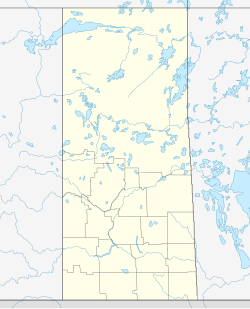St. Walburg is a town in west-central Saskatchewan's prairie region on Highway 26. St. Walburg is surrounded by the Rural Municipality of Frenchman Butte No. 501. The Bronson Provincial Forest is about 10 kilometres (6.2 mi) to the north.
St. Walburg | |
|---|---|
Town | |
 View of St. Walburg | |
| Coordinates: 53°38′01″N 109°12′02″W / 53.6335°N 109.2006°W | |
| Country | Canada |
| Province | Saskatchewan |
| Census division | Division No. 17 |
| Post office Founded | 1915 |
| Government | |
| • Mayor | George Prudat |
| • Administrator | Shiloh Bronken |
| • MLA Constituency of Meadow Lake | Jeremy Harrison |
| • MP Battlefords—Lloydminster | Rosemarie Falk |
| Area | |
• Total | 2.12 km2 (0.82 sq mi) |
| Population (2011) | |
• Total | 716 |
| • Density | 338.0/km2 (875/sq mi) |
| Time zone | UTC−6 (Central standard time (CST)) |
| Postal code | S0M 2T0 |
| Area code | 306 |
| Highways | Highway 26 |
| Website | stwalburg |
| [1] | |
The community is named for the wife of the first postmaster, but also to honour Saint Walpurga, an 8th century English nun educated by the Benedictines, who was canonized for a life dedicated to evangelical work among the German people.

History
editThe town and surrounding area were originally settled by Germans between the 1910s and 1930s, with a few Polish, Ukrainian and French settlers arriving later.
The Canadian Northern Railway (CNoR) continued the extension of its northwest branch line from North Battleford, reaching St. Walburg in 1919.[2][3] This caused a boom in the area, with many homesteaders arriving within months, now able to deliver their production to the grain elevators at St. Walburg. The branch had served Hamlin, Prince, Meota (1910 extension), Cavalier, Vawn, Edam, Mervin, Turtleford (1914 extension), Cleeves, Spruce Lake and St. Walburg, with a fork to Paradise Hill and Frenchman Butte.[3][4] Later the rail line and the Saskatchewan Highway 26 ran beside each other from Prince to St. Walburg. The Canadian National Railway abandoned the entire branch line in 2005, when the remaining grain elevators closed.[4] The line was officially abandoned in 2008.
Demographics
editIn the 2021 Census of Population conducted by Statistics Canada, St. Walburg had a population of 591 living in 276 of its 331 total private dwellings, a change of -14.2% from its 2016 population of 689. With a land area of 2.02 km2 (0.78 sq mi), it had a population density of 292.6/km2 (757.8/sq mi) in 2021.[5]
Economy
editThe main industries are grain and cattle farming. The oil and natural gas industries have become increasingly important in the area.
Notable people
edit- Count Berthold von Imhoff (1868–1939)[9] an artist known for his religious murals and paintings[10][11] homesteaded southwest of St. Walburg in 1914. In 1937 he was awarded a knighthood in the Pontifical Order of St. Gregory the Great by Pope Pius XI.[9] He is buried in the St. Walburg Cemetery next to his wife Matilda. The Imhoff Museum (the home, studio and farm of Imhoff) was designated a Saskatchewan Heritage Property in 1993.[12]
- Cal Nichols, former chairman of the Edmonton Oilers Hockey Club.
See also
editReferences
edit- ^
- National Archives, Archivia Net, Post Offices and Postmasters, retrieved May 15, 2013
- Government of Saskatchewan, MRD Home, Municipal Directory System, retrieved May 15, 2013
- Canadian Textiles Institute. (2005), CTI Determine your provincial constituency, archived from the original on September 11, 2007
- Commissioner of Canada Elections, Chief Electoral Officer of Canada (2005), Elections Canada On-line
- ^ Russell, Edmund T. (1973), What's In a Name: The Story Behind Saskatchewan Place Names (3rd edition), Saskatoon, Saskatchewan: Western Producer Prairie Books, p. 200, ISBN 0-88833-053-7
- ^ a b Waghorn's Guide (1914). "Map of Western Canada showing part of Manitoba, Saskatchewan, Alberta". Stovel Co. Ltd. Retrieved June 24, 2015.
- ^ a b Troy A. M. Zimmer (September 14, 2008). "Abandoned Rail Lines in Saskatchewan" (PDF). Saskatchewan Trails Association. Archived from the original (PDF) on January 24, 2014. Retrieved June 24, 2015.
- ^ "Population and dwelling counts: Canada, provinces and territories, census divisions and census subdivisions (municipalities), Saskatchewan". Statistics Canada. February 9, 2022. Retrieved April 1, 2022.
- ^ "2011 Community Profiles". 2011 Canadian census. Statistics Canada. March 21, 2019. Retrieved January 11, 2013.
- ^ "2006 Community Profiles". 2006 Canadian census. Statistics Canada. August 20, 2019.
- ^ "2001 Community Profiles". 2001 Canadian census. Statistics Canada. July 18, 2021.
- ^ a b "Count Berthold Von Imhoff". Retrieved December 7, 2012.
- ^ "Virtual Saskatchewan (Count Berthold Von Imhoff)". Retrieved December 7, 2012.
- ^ "Imhoff Gallery". Archived from the original on August 27, 2014. Retrieved December 7, 2012.
- ^ "Municipal Heritage Property (Saskatchewan)" (PDF). Archived from the original (PDF) on December 16, 2013. Retrieved December 7, 2012.
| North: Loon Lake, Saskatchewan Meadow Lake, Saskatchewan | ||
| West: Paradise Hill, Saskatchewan Lloydminster, Alberta | St. Walburg | East: Turtleford, Saskatchewan Glaslyn, Saskatchewan |
| South: Maidstone, Saskatchewan |
